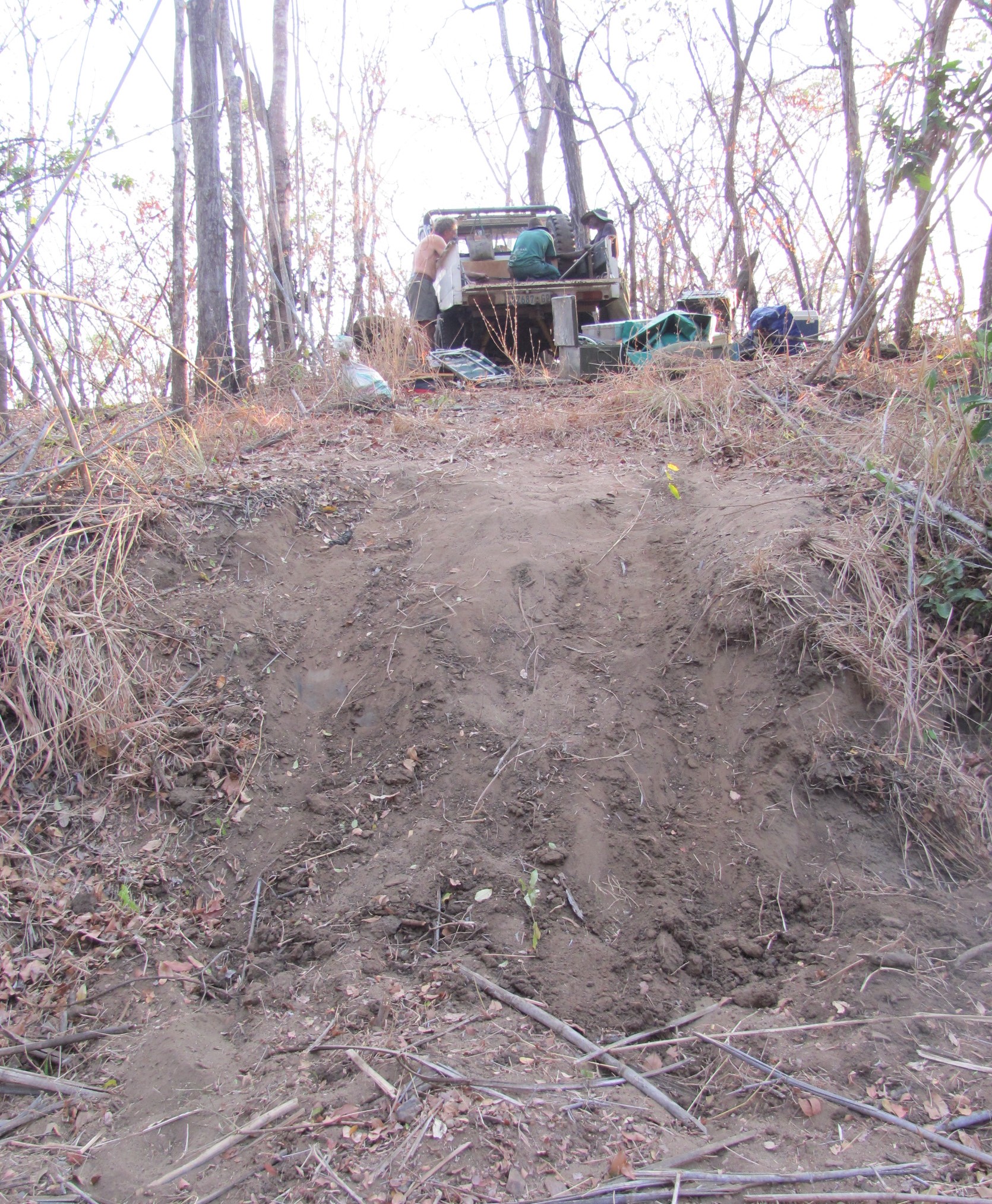Getting to those truly untouched parts of wilderness that I prefer, means eventually running out of any form of road or track. Then starts the undertaking of moving through bush. Moving through virgin African bush is not for the faint-hearted. It is an undertaking that pushes human and machine close to their limits.
Sometimes, for stretches where the terrain is not steep and the growth not too dense, one is able to meander along quite pleasantly in roughly the desired direction, even if it means setting the Old Man to run over a few shrubs or young trees.
Sometimes one is lucky to find an ancient elephant path that runs in roughly the direction one intends to go. They are typically not quite wide enough to take the vehicle, but the flattening and breaking done over many decades by the giants do ease the passage considerably, and I am always grateful for one.
Mostly those more pleasant meanders end quickly, and then it is either dense woodland or scrubland one has to negotiate. In woodland, a lot of chopping and clearing needs to be done to get through. It takes time and energy and it is usually too much work for a single person to handle, even if a lot of flattening of shrubs and smaller trees is left to the vehicle. At best it ends up taking considerable punishment, but not as much as through scrubland, like in large parts of the Kalahari savanna. There shrubs and small trees are between one metre and two metres tall (I am not even counting the lesser shrubs and grass) and the growth is dense – too dense to try and chop away. But it is possible to break though on your own if you have a really sturdy vehicle. The risk of disabling damage to the vehicle is however high, and I find driving through it for long distances draining. One is constantly hovering on the edge of disaster. Visibility is mostly limited to a metre or three, and the risk of hitting some hidden obstacle or aardvark digging is high. Also, brutal violence is happening all the time to the front and to the underside the vehicle.
The driver isn’t even spared. Once, breaking through dense thorn veldt, I had a branch strike me in the right eye through the window. It was excruciatingly painful and the eye was completely blinded. I wondered if I would permanently lose vision in it, or perhaps even the eye. The problem with an eye injury when you are alone is that you are unable to view it to assess the seriousness. How would it develop? Should I be sensible and turn back? Should I keep it open or closed up?
In the end I decided to carry on. It would have taken more than four days to get back to anywhere where I could have it properly looked at anyway. I washed it out with warm salt water and slapped on an improvised eye patch. It helped a bit, but it throbbed like a volcano for three days. Then it was just sore and irritating, but my vision remained blurred for the remainder of the expedition, which is a serious draw-back when you rely so heavily on your senses.
However, sometimes working through the bush is the only way one can get into an area, and then it’s a matter of the choices one makes – one’s capacity for risks and danger and what the limits of one’s endurance and that of your vehicle is.
The picture shows an ancient elephant path through a dry gully in the north of Mozambique. It is more suited to four-legged animals than to four-wheeled vehicles, but I judged it the best available crossing point after hopeful but fruitless exploration up and down on foot. Such gullies are numerous in that area.
One could easily encounter three or more like this per day. It requires the right mix of fortitude, attitude and foolishness to take on. For this one we had to offload some of the heaviest stuff and carry it across manually to ease the load on the winch, and do quite a bit of chopping and picking and shovelling and finally strenuous cranking of the winch handle – for the best part of the morning.
I thought to crop in an extract from my book, Paths of the Tracker to further illustrate:
The track had now all but ceased to exist. A few times Henry stopped at deep gullies and had them work on the approach or exit with the bush pick and shovel, or pile some logs or rocks into the bottom to improvise a crossing. On more than one occasion, he turned off the track and broke through the bush to get around trees that lay across it – pushed over by elephant, he said. A few times they had to make quite long detours to get across ravines where the bottom had been washed away so deep that it would have taken a major effort to fix it. Then they had to use the axe and pangas to chop a path through the forest.
Craig was unhandy with the tools. It took him several blows to sever a branch that Henry would in a single effortless slash. He threw himself into the work with the pick and shovel, convinced that his running- and gym-honed body would be far superior to his uncle, but his hands blistered quickly and his muscles tired; he was just much less efficient than Henry, who seemed to be able to maintain a steady hard pace. He was relieved every time the older man offered to take over, but it made him feel more inept and vaguely rebellious.
Despite their efforts the vehicle generally still had to take a lot of strain, flattening shrubs and young trees and lurching its heavy load through deep ruts and up and down impossibly steep and rough slopes. Craig was quietly relieved that he had handed over the wheel.
They began spotting more and more game. Small herds of buffalo, hartebeest, zebra, eland and even sable sifted away into the trees as they approached.
By mid-afternoon, when they had battered their way through another detour, Craig switched on his GPS. “Gee Uncle Henry, we’re not making much progress. The GPS says we’ve only covered a straight line distance of about thirty kilometres in the last five hours.”
“Yeah, well, that’s travelling in the African bush. It’s hard on people and hard on vehicles. It’s unfortunately a bit different from the videos posted on the Net and on staged TV programmes,” Henry said with a hint of vindictive sarcasm and then, mercifully: “But hey, there’s no reason to try and set new land speed records here. Let’s take a break and have a decent cup of tea. What do you say?”
Craig had been desperate to give his aching muscles and blistered hands a rest. He sank into the chair Henry had pulled off the back and sat watching his uncle brew the tea on the dropped tailgate. It accusingly revealed the set of bush breaking equipment, battered and burnished with wear from many hard journeys.
If they had come in his little Land Rover its shiny black enamel would by now at the very least have been badly scratched – probably dented too. The assortment of accessories that he had had fitted to it for…, he wasn’t sure for what, vaguely for exactly this type of work, now seemed feeble.
It was a good thing Henry had steadfastly insisted that they come in his rugged old Land Cruiser. “I know I can fix most of what could go wrong with it Craig, right there, in the bush. Your little Land Rover is nice for the kind of safaris to the Okavango or to diving spots along the Mozambican coast you were telling me about, with some other vehicles in company. But I doubt it’s rugged enough for what we are likely to expect of it, and, it’s full of electronics. If something goes wrong, I wouldn’t even know where to start.”


Happy that you enjoy Gayle
Awesome is all I can say about being in nature.